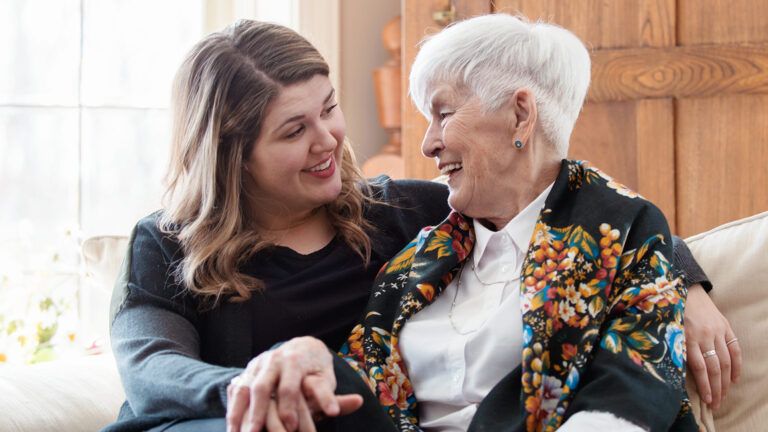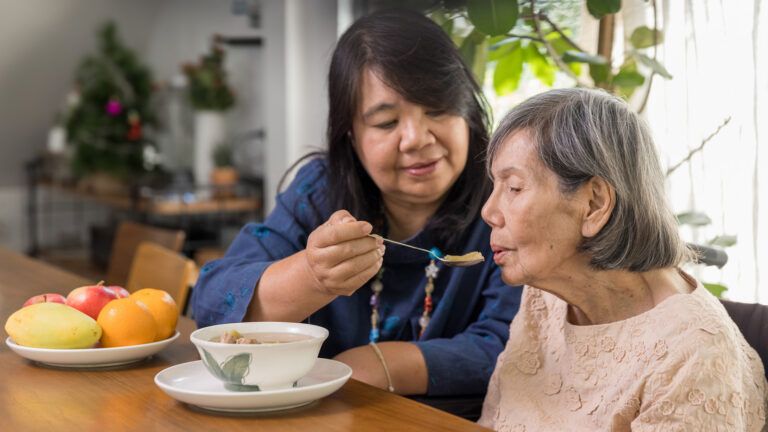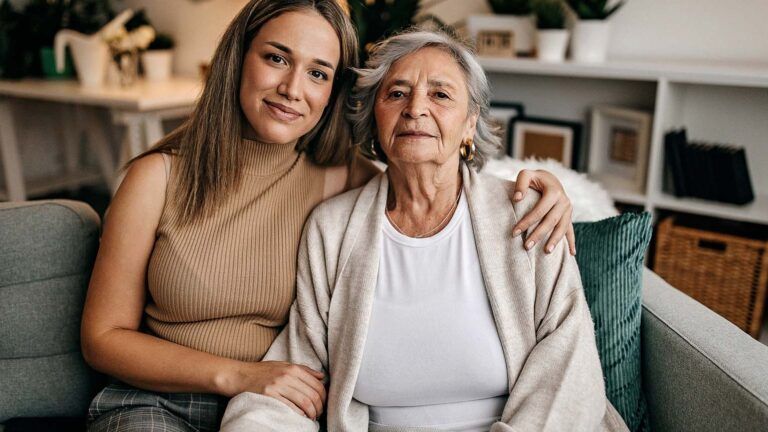Lisa Weitzman, LISW-S, is the WeCare Manager of Business Development at Benjamin Rose Institute on Aging
It’s 3 a.m. and you’re jolted awake. You must have fallen asleep a few hours ago, while you were struggling to hold your eyes open to read a few pages of a book. You were exhausted when you finally fell into bed after a full day of work, making dinner for the family and going through photo albums with your mom. Now you notice that the light in the living room is on. Mom must be up again. You jump up to make sure she’s okay. She’s restless, but fine. You gently lead her back to bed and calm her down, and now you’re wide awake. It’s a familiar routine.
Know that you’re not alone. When you’re a caregiver for an older loved one, getting adequate rest can be a challenge for both of you. Aging alters the way people sleep, so when your loved one is up, you tend to be too. Changes in hormone levels affect “sleep architecture,” the cycle of progressing through different stages of sleep, which means that older adults often experience less deep sleep and wake up more frequently throughout the night (Insomnia and Seniors, Sleepfoundation.org, 9/28/20). In addition, the body’s natural method of keeping time, known as the circadian clock, also shifts, which impacts how long and how well people sleep as they age. Older adults may fall asleep earlier in the evening and wake up even earlier, which can lead to more napping, making it even harder for them to fall sleep when night comes. Studies now show that up to 48 percent of older adults exhibit symptoms of insomnia (Dhavel Patel et al., Insomnia in the Elderly, Journal of Clinical Sleep Medicine, 6/15/18). Other possible factors include chronic health conditions and medication interactions.
On top of this, the daily constraints of the Covid-19 pandemic have made quality sleep an even more elusive commodity. It has caused disruptions to activities and stresses around finances. Being isolated and curtailing physical and mental activities can lead to depression. Fears around health and contact with others dominate public thinking and uncertainty has filled every aspect of life. According to research by Sleep Medicine, “Simple routines typically performed at fixed times, such as waking up in the morning, showing up at work, eating meals, and maintaining social and leisure activities have all been disrupted by the pandemic and social confinement.” All these things can make it more difficult for you and your loved one to get the sleep you need. But there are several effective ways to establish good sleep habits for both of you.
Adequate rest may be particularly challenging, yet necessary, for you now. As a caregiver, you may be balancing work from home and the added responsibility of homeschooling your children. This can further contribute to elevated stress levels, due to the often-conflicting demands of employers, caregiving and school requirements. (Dr. Ellemarije Altena et al., Dealing with sleep problems during home confinement due to the Covid-19 outbreak, Beck Institute). All told, the stresses brought about by Covid-19 can negatively impact restorative sleep, which in turn can increase feelings of stress and anxiety, making sleep even harder to come by, and coping in general more of a challenge. So, it’s important to work on your sleep routine now.
Tips to improve your loved one’s sleep habits, and your own
Regardless of age, sleep is vital to physical and emotional health. According to HelpGuide, “A good night’s sleep helps improve concentration and memory formation, allows your body to repair any cell damage that occurred during the day, and refreshes your immune system, which in turn helps to prevent disease.” So, it is important to get started now toward developing a good sleep routine.
Although sleep medications may not be recommended, there are several ways to establish better sleep habits for yourself and your loved one. The following tips may help you to see improvement:
1. Follow a regular sleep schedule. Structure makes a difference, so set times to turn in and wake up every day.
2. Help your loved avoid napping during the day, in order to promote better sleeping at night.
3. Create a dark and quiet sleep environment with comfortable, cool temperatures.
4. Make it a point to practice relaxation or mindfulness before you go to bed.
5. Try to include some physical activity into your daily schedule. It’s important, however, to consult with your loved one’s doctor before incorporating exercise into his or her schedule.
6. Keep computer and phone screen usage to a minimum in the evening.
7. Try to get at least two hours of sunlight every day. Sunlight has been shown to help regulate the sleep-wake cycle (Sleep tips for older adults, HelpGuide).





